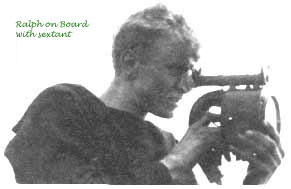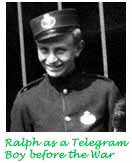

|
|||||
| Ralph Stobart Robson, signalman, life in the British Royal Navy World War Two, sinking of Prince of Wales and the Repulse, Singapore | |||||
|
|||||
|
|||||
|
The sergeant instructor did not look very pleased. He took us back to his barracks where we both had to give a full report. The officer who had been with us started to hint that Tubby might be faced with a charge of neglect. I thought it had gone far enough. "Excuse me, sir. Signal Boynton was entirely under the control of the sergeant at the time. Besides, I think the place where the tuition took place was asking for trouble". With a grunted "I want no comments from you", we were dismissed. The incident died the death. Poona was like most Indian cities. It was crammed with natives, stalls and shops. The noise, as usual, was terrific. After a few days it was up sticks and off back to Bandra. The atmosphere was slowly changing. Small clouds were now visiting what was usually a hot, blue sky. No rain was produced. It seemed as if the monsoon was imminent. On the Saturday of the week in which these weather disturbances had started, the lads prepared themselves for a foray into Bombay. They were dressed in their sailor whites. We had already been prohibited from wearing our sailor hats with khakis and were now provided with Australian bush hats to be worn instead. The wearing of sailor shorts was also prohibited after dark because of the danger of malaria. Tubby and I watched them fall in, be inspected and then, after being dismissed, stream off down the road to Bandra Station. He and I had been delegated as camp guards and were confined to barracks. I had watched the vultures coming to and fro on the palms with their usual squabbling. As the wind was blowing from due south I decided to have a walk up to the top of the spine. As I got nearer to the top a terrible stink arose, and when I got to the top I saw the reason why. A huge wall of blackness was advancing from the city. Nine months of filth was about to engulf us. I raced down to the tent shouting "Tubby!". Together the two of us stood outside the tent and tried not to breathe the stuff. Eventually it drained away and we looked at each other. We looked like deep black natives. Tubby said, "I'm going for a bath". I told him to wait a while, I'd noticed that the tent, which had been wobbly before, was now worse. I then told Tubby I was going for a big wooden tent hammer which I had seen up beside the dining hall. I soon arrived back with it and started to try and drive the tent pegs in deeper. It was like trying to drive them into steel. The ground was packed hard after nine months of sun. I stopped and decided to walk back up to the top of the ridge. The wind was still blowing as hard. The lights of Bombay were now clear and it seemed as if the trouble was over. I was no India Hand, but I still had a feeling of unease. As I was standing thinking, the lights of Bombay suddenly disappeared like a curtain drawn down at a theatre. I sensed instantly what it was; a curtain of rain was advancing. Rushing down the hill once again I yelled out for Tubby. He was alert at once. Then with a roar the rain was upon us. It was like nothing I had ever heard before. Soon water began streaming down the hill and a fine spray began drifting through the tent. We stood inside the tent in the light of one oil lamp and watched it start to sag. For a nightmare three hours we struggled with it, but we at least managed to hold it up. All around us tents were collapsing and when our mates started to arrive back the camp was completely flattened. Ours was the only tent standing. All their whites were soaked and filthy. Eventually they had to kip in the dining hall together with other stragglers. The sun didn't rise, but daylight broke. Our tent mates had a least managed to hang up their whites, but the rest had to sleep in them or manage to borrow a blanket. After an almighty struggle the tents were erected and then the sorry business of sorting things out began. At 9 a.m. all hands had to fall in on the parade ground - things had to be "as usual". The only thing I really remember about that morning was the fact that the officer in charge announced that the invasion of North Africa had begun. The statement was greeted with cheers. At last the tents were all upright, but then another great disaster was discovered. Some of the sailors had been eagerly buying big, green cases ashore such as were issued to Chiefs and POs. In The disturbance it was discovered that most of the clothing that they contained had been spoiled or eaten by white ants. |
|||||
|
|||||
